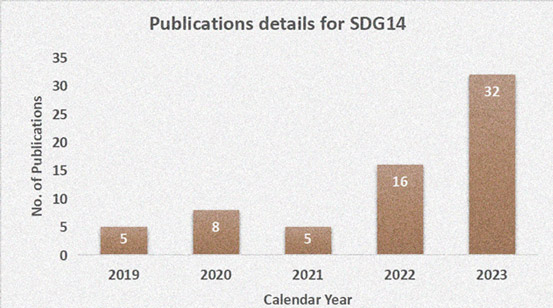
Research Initiatives
Research Publications: Lovely Professional University (LPU) has initiated an extensive research agenda to address critical environmental challenges, particularly focusing on aquatic ecosystems. Key research areas include the impact of plastics and microplastics on climate change, sustainable wastewater management, aquaculture advancements, and the remediation of toxic contamination in aquatic habitats. LPU's research also explores the potential of nanotechnology in aquaculture, the effects of antibiotic contamination in rivers, and innovative solutions for microplastic degradation. Through advanced studies in biotechnology, nanomaterials, and microbial applications, LPU aims to contribute to the sustainable management and protection of freshwater and marine ecosystems.
Research Publications: Lovely Professional University (LPU) has initiated an extensive research agenda to address critical environmental challenges, particularly focusing on aquatic ecosystems. Key research areas include the impact of plastics and microplastics on climate change, sustainable wastewater management, aquaculture advancements, and the remediation of toxic contamination in aquatic habitats. LPU's research also explores the potential of nanotechnology in aquaculture, the effects of antibiotic contamination in rivers, and innovative solutions for microplastic degradation. Through advanced studies in biotechnology, nanomaterials, and microbial applications, LPU aims to contribute to the sustainable management and protection of freshwater and marine ecosystems.
List of Research Publications for the year 2023
| Authors | Title |
|---|---|
| Sharma S.; Sharma V.; Chatterjee S. | Contribution of plastic and microplastic to global climate change and their conjoining impacts on the environment - A review |
| Singh S.; Singh L.; Kumar V.; Ali W.; Ramamurthy P.C.; Singh Dhanjal D.; Sivaram N.; Angurana R.; Singh J.; Chandra Pandey V.; Khan N.A. | Algae-based approaches for Holistic wastewater management: A low-cost paradigm |
| Yousuf S.; Tyagi A.; Singh R. | Probiotic Supplementation as an Emerging Alternative to Chemical Therapeutics in Finfish Aquaculture: a Review |
| Wangda T.; Bashir S.; Suberi B.; Vadhel A.; Malik T.; Mohan A. | Species diversity, abundance, and distribution of freshwater prawns along a selected perennial stream in Ngangla Gewog, Zhemgang, Southern Bhutan |
| Kumari P.; Kumar P.; Singh J. | Toxic contamination of aquatic habitat and its remediation |
| Angmo D.; Dutta R.; Singh J.; Chowdhary A.B.; Quadar J.; Thakur B.; Kaur H.; Sharma M.; Singh S.; Vig A.P. | Biochemical responses, growth and reproduction of earthworm in low density polyethylene (LDPE) |
| Thakur K.; Kuthiala T.; Singh G.; Arya S.K.; Iwai C.B.; Ravindran B.; Khoo K.S.; Chang S.W.; Awasthi M.K. | An alternative approach towards nitrification and bioremediation of wastewater from aquaponics using biofilm-based bioreactors: A review |
| Morya S.; Kumar Chattu V.; Khalid W.; Zubair Khalid M.; Siddeeg A. | Potential protein phycocyanin: an overview on its properties, extraction, and utilization |
| Raj N.S.; Arivarasan V.K.; Hameed A.S.S.; Swaminathan T.R. | Nanotechnologies in the Health Management of Aquatic Animal Diseases |
| Jassal P.S.; Kaur D.; Kaur M.; Pallavi; Sharma D. | Level of antibiotic contamination in the major river systems: A review on South Asian countries perspective |
| Zaharin H.A.; Ghazali M.J.; Khalid M.; Nagarajan T.; Pin W.W.; Ezzah F.; Gerard O.; Walvekar R.; Rasheed A.K. | Tribological, Oxidation and Thermal Analysis of Advanced Microwave–Hydrothermal Synthesised Ti3C2Tx MXene as Additives in Outboard Engine Oil |
| Dar S.A.; Javeed K.; Al-Shuraym L.A.; Sayed S.; Devi Y.K.; Hassan W.; Ahmed M.M.M.; Alkenani N.A.; Gajger I.T.; John J. | Assessment of nest architecture and pollination efficiency of Lasioglossum (Evylaeus) marginatum (Helictidae: Hymenoptera) |
| Sahu S.; Kaur A.; Khatri M.; Singh G.; Arya S.K. | A review on cutinases enzyme in degradation of microplastics |
| Kauts S.; Shabir S.; Yousuf S.; Mishra Y.; Bhardwaj R.; Milibari A.A.; Singh S.K.; Singh M.P. | The evidence of in-vivo and in-vitro studies on microplastic and nano plastic toxicity in mammals: A possible threat for an upcoming generation? |
| Wani A.K.; Chopra C.; Singh R.; Ahmad S.; Américo-Pinheiro J.H.P. | Mining microbial tapestry using high-throughput sequencing and In silico analysis of Trehalose synthase (TreS) derived from hot spring metagenome |
| Ramesh A.S.; Meghana N.V.P.; Tripathy A.; Karthik L.; Kiran G.; Arivarasan V.K. | Future Prospects of Nanotechnology in Aquaculture |
| Khayal A.; Yadav V.K.; Wanale S.G.; Yadav K.K.; Meena A.; Shkir M.; Ahmad Z.; Jeon B.-H. | Recent Advances in the Applications of Nanotechnology and Nanomaterials in the Petroleum Industry: A Descriptive Review |
| Raj G.S.; Rawat M.; Bhadwar N.; Kumari K.; Shukla S.; Dalal J. | A QUALITATIVE STUDY OF HEAVY METALS IN INDIAN MACKERAL BY FLOURESENCE SPECTROSCOPY |
| Thakur B.; Singh J.; Singh J.; Angmo D.; Vig A.P. | Identification and characterization of extracted microplastics from agricultural soil near industrial area: FTIR and X-ray diffraction method |
| Mann G.S.; Azum N.; Khan A.; Rub M.A.; Hassan M.I.; Fatima K.; Asiri A.M. | Green Composites Based on Animal Fiber and Their Applications for a Sustainable Future |
| Rai M.; Pant G.; Pant K.; Aloo B.N.; Kumar G.; Singh H.B.; Tripathi V. | Microplastic Pollution in Terrestrial Ecosystems and Its Interaction with Other Soil Pollutants: A Potential Threat to Soil Ecosystem Sustainability |
| Sahoo M.M.; Swain J.B. | Investigation and comparative analysis of ecological risk for heavy metals in sediment and surface water in east coast estuaries of India |
| Wani A.K.; Akhtar N.; Naqash N.; Rahayu F.; Djajadi D.; Chopra C.; Singh R.; Mulla S.I.; Sher F.; Américo-Pinheiro J.H.P. | Discovering untapped microbial communities through metagenomics for microplastic remediation: recent advances, challenges, and way forward |
| Fayaz U.; Bashir I.; Fayaz J.; Bashir O.; Manzoor S.; Amin T.; Bhat S.A. | Food processing byproducts: Their applications as sources of valuable bioenergy and recoverable products |
| Kaur A.; Bhatia M. | Stochastic game network based model for disaster management in smart industry |
| Naqash N.; Manzoor S.; Singh R. | Microplastic hazard, management, remediation, and control strategies: a review |
| Dubey S.; Mukhtar H.M.; Sunita; Kalsi V. | Therapeutic Potential of Tecoma stans - An Invasive Weed |
| Singhal A.; Sneha; Kaur H.; Duggal A.S.; Malik P.K.; Singh R. | Emerging Technologies in the Fish Farming by Deploying Artificial Intelligence |
| Khursheed S.; Dutta J.; Ahmad I.; Rather M.A.; Badroo I.A.; Bhat T.A.; Ahmad I.; Amin A.; Shah A.; Qadri T.; Habib H. | Biogenic silver nanoparticles: Synthesis, applications and challenges in food sector with special emphasis on aquaculture |
| Aziz S.; Uzair B.; Ali M.I.; Anbreen S.; Umber F.; Khalid M.; Aljabali A.A.; Mishra Y.; Mishra V.; Serrano-Aroca Á.; Naikoo G.A.; El-Tanani M.; Haque S.; Almutary A.G.; Tambuwala M.M. | Synthesis and characterization of nanobiochar from rice husk biochar for the removal of safranin and malachite green from water |
| Kushwaha R.K.; Gummadi A.; Singh P.P.; Nithyaa M.R. | A Hybrid Algorithm for Adopting the WSM System to Park the Massive Number of Vehicles in Linear and Manage the Energy Consumption |
| Ramesh A.S.; Tripathy A.; Meghana N.V.P.; Karthik L.; Kiran G.; Arivarasan V.K. | Introduction of Nanotechnology Intervention in Aquaculture |
Patents: Researchers at Lovely Professional University (LPU) have demonstrated a strong commitment to addressing critical challenges related to Sustainable Development Goal 14 (SDG 14) by focusing on innovative solutions for aquatic ecosystems and marine pollution issues. Their work includes developing improved methods for wastewater treatment, enabling the efficient utilization of wastewater, and recycling of waste plastics. Following is the list of patents for 2023:
| Title of the Patent | Patent No |
|---|---|
| Methods of preparation of green paints and primers using plant waste material | IN425926 |
| A novel formulation to decompose plastic waste and process thereof | IN202211013217 |
| A novel paver for rainwater harvesting and method thereof | AP/P/2022/13041 |
| Plant disease classification using deep learning | IN202311015204 |
| Plant disease detection using deep learning techniques | IN202311016469 |
| Smart greenhouse for monitoring temperature, soil and water level | IN202311019589 |
| An IoT-based aquaculture monitoring device | IN202311019015 |
| Method for improving the growth and yield of a plant | IN202311018463 |
| Method for improving physiology and yield of the plant | IN202311018468 |
| Method for improving physiological and biochemical activities of a plant | IN202311018469 |
| Method for preparation of bio-manure for plants | IN202311020189 |
| A novel device for plastic biodegradation | IN202211020620 |
| Analysis of Plastic Waste Management Strategies and it's environment impact in smart cities | IN202341038283 |
| A Novel Method for the Treatment of Wastewater | IN202311053632 |
| Waste water purification system and method | IN202311066329 |
| Water supply management system and method thereof | IN202311064406 |
| Inventive and novel mechanism for pumping water into the field without using any motors | IN202311062397 |
| Integrated aquaculture environmental management system (IAEMS) | IN202311073078 |
| Aquaculture monitoring and controlling system using an underwater machine | IN202311073133 |
| An intelligent tactical device for rainwater harvesting & air filtering system | IN202311073128 |
| A novel IoT-based device for improved water drainage and hazard control | IN202311075347 |
| Vision-based comprehensive waste monitoring system for closed dumping grounds with sustainable alerts and cloud-based mechanisms for municipal solid waste management | IN202311082609 |
Toxic discharge from industrial processes significantly contributes to marine biodiversity and aquatic ecosystem pollution. Lovely Professional University (LPU) has recognized this issue and has actively contributed to mitigating its impact. LPU's efforts are notably directed towards reducing contaminants in textile industry effluent and developing effective treatment methods. LPU plays a crucial role in safeguarding marine biodiversity and aquatic ecosystems by addressing the pollution issues associated with the textile industry.
| Name of the Funding agency | Title of the Project |
| ISRO | Assessment of fluoride contamination in groundwater in Punjab using GIS and machine learning techniques. |
| Nikom chemicals | Identification of contaminants in textile industry effluent and their treatment methods |
technology and bioengineering. These publications reflect LPU's commitment to advancing knowledge and addressing critical environmental challenges. The books encompass a diverse range of topics, from the intricate polyandrous mating system of Queen Honey Bees, shedding light on their unique reproductive biology, to exploring the vital relationship between microbes and the environment, which is crucial for providing sustainable ecosystem services. Additionally, LPU's faculty delves into the profound impact of changing climates on the human microbiome, providing insights into the intricate interactions between microbes and their hosts. Book Chapters: LPU researchers explore the technologies for waste water treatment to prevent and maintain the existing Aquatic ecosystem
| Title of the book | Author Detail | ISBN/ISSN number of the proceeding |
|---|---|---|
| Integrated Environmental Technologies for Wastewater Treatment and Sustainable Development | Manpreet Kaur, Mukesh Kumar, Rohan Samir Kumar Sachan, Inderpal Devgon, Dr. Arun Karnwal | 978-0-323-91180-1 |
| Development in Wastewater Treatment Research and Processes | Neha Singh, Dr. Umesh Goutam | 978-0-323-85839-7 |
| Pesticides Remediation Technologies from Water and Wastewater | Abdul Basit Wani, Daljeet Singh Dhanjal, Dr. Joginder Singh Panwar | 978-0-323-90893-1 |
| Additive Manufacturing for Plastic Recycling: Efforts in Boosting a Circular Economy | Rupinder Singh, Ranvijay Kumar | 9781003184164 |
Lovely Professional University (LPU) has been actively involved in addressing challenges related to aquatic ecosystem conservation and sustainable water management in the rural areas of Punjab. These contributions reflect LPU's commitment to environmental sustainability and the preservation of vital aquatic ecosystems.
Following is the list of consultancy projects
| Title of project | Organization/Agency |
|---|---|
| Low-cost rainwater harvesting system design and installation in the govt. building of rural Punjab | Punjab department of rural development and panchayats |
| Renovation and construction of ponds for water conservation as a part of integrated watershed management in villages | Punjab department of rural development and panchayats |
| Low-cost rainwater harvesting system design and installation in the primary school of rural Punjab | Punjab department of rural development and panchayats |
| Design and fabrication of rainwater collection and purification system | Punjab department of rural development and panchayats |
| Design of water softening plant and installation for commercial use | Nikom chemicals |
| SUSTAINABLE UTILISATION OF SHREDDED PLASTIC FILE FOLDERS WASTE | PYRAMID E SERVICES |
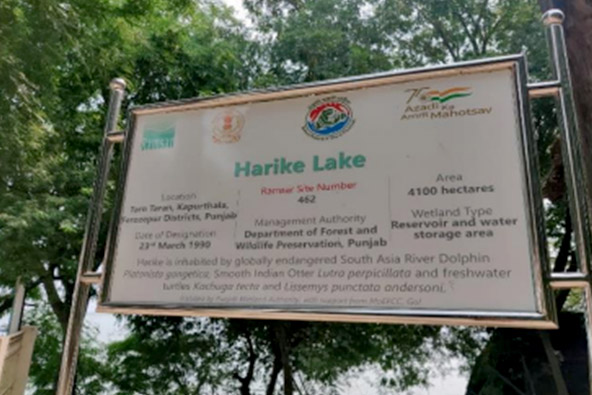
Link to the Harike Wetland Research Project: Click here
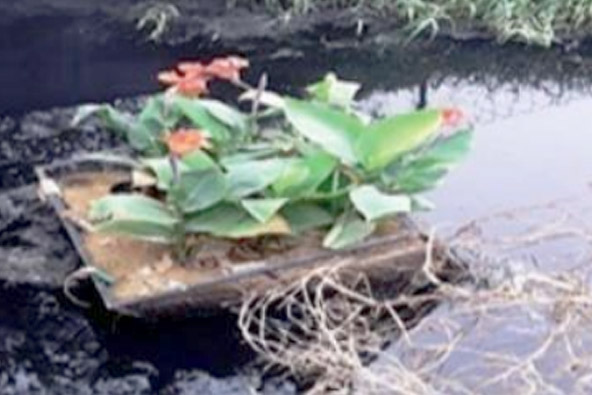
Regeneration of Wetland under research project
Wetland development is an important research field to maintain life sustainability in water and surrounding. With large level of urbanization, human disturbances have resulted in reduction and vanishing of wetlands. Since wetlands support both aquatic and terrestrial organisms, hence their sustenance is of major importance. LPU researchers and PhD Scholars are working on renewal of wetlands by utilizing specially developed biological/non-biological matrix for growing specially adapted plants (hydrophytes) and renew the characteristic of wetland (hydric)soils.
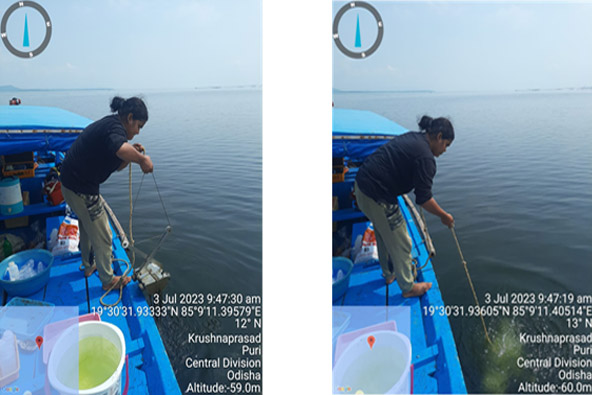
Research work on Meiofauna presence in marine sediments
About the Research: LPU Research scholar is working on Thrust area “Spatial and Seasonal variation of Polychaete along the Macrophytic and Non-Macrophytic area of Chilika Lagoon, India”. In this research, samples were collected from the Gulf of Kachchh during three different seasons. Through analyzing meiofaunal communities in these diverse conditions, study aims to assess sediment quality and identify potential impacts of pollution and climate change. These sediment samples have been carefully processed in the laboratory to extract and identify the polychaetes present. The collected data would then be analyzed to determine the spatial and seasonal patterns of polychaete distribution. The results may contribute to our understanding of the overall biodiversity and ecosystem dynamics of the Chilika Lagoon, as well as provide valuable information for its conservation and management
About the Research: LPU Research scholar is working on Thrust area “Spatial and Seasonal variation of Polychaete along the Macrophytic and Non-Macrophytic area of Chilika Lagoon, India”. In this research, samples were collected from the Gulf of Kachchh during three different seasons. Through analyzing meiofaunal communities in these diverse conditions, study aims to assess sediment quality and identify potential impacts of pollution and climate change. These sediment samples have been carefully processed in the laboratory to extract and identify the polychaetes present. The collected data would then be analyzed to determine the spatial and seasonal patterns of polychaete distribution. The results may contribute to our understanding of the overall biodiversity and ecosystem dynamics of the Chilika Lagoon, as well as provide valuable information for its conservation and management
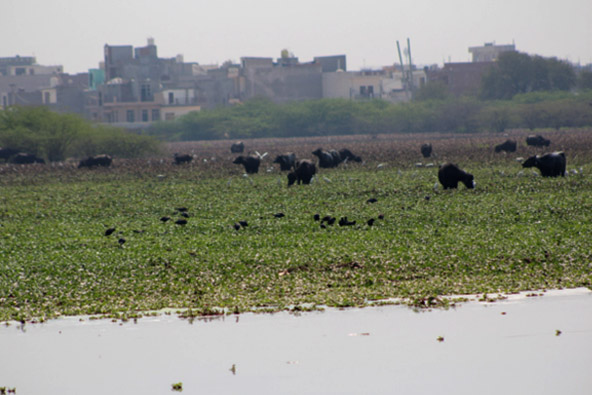
Disappearing Wetland: A Study of Basai Wetlands, Haryana (India)
Basai wetlands, located in Gurgaon city in Gurugram district of Haryana, India has been experiencing rapid shrinkage in its area over recent years due to continuous encroachment resulting from ever expanding city. The research, based on secondary data, examines the importance, threats and challenges faced by the wetland along with presenting a comparison between Basai and Sultanpur wetlands, which are located close to each other but in terms of conservation efforts display wide disparities. The paper highlights the extent of damage suffered by Basai wetlands on account of government and public apathy. Link to the study of Basai Wetland : Click here
Basai wetlands, located in Gurgaon city in Gurugram district of Haryana, India has been experiencing rapid shrinkage in its area over recent years due to continuous encroachment resulting from ever expanding city. The research, based on secondary data, examines the importance, threats and challenges faced by the wetland along with presenting a comparison between Basai and Sultanpur wetlands, which are located close to each other but in terms of conservation efforts display wide disparities. The paper highlights the extent of damage suffered by Basai wetlands on account of government and public apathy. Link to the study of Basai Wetland : Click here
| Sr. No. | Detail activities on the study of Wetlands |
| 1 | Devi, Moirangthem Roshni, and Ripudaman Singh. "anthropogenic impacts on a wetland: a case study of loktak lake." |
| 2 | Namgyel, Ugyen, and Ripudaman Singh. "Identifying Threats and Public Attitude towards Wetland Conservation: Case of Bumdeling Ramsar Site, Bhutan.", International Journal of All Research Education and Scientific Methods (IJARESM), ISSN: 2455-6211 Volume 9, Issue 4, April -2021 |
| 3 | Siraj Yousuf Parray, Bhupendra Koul, Maulin P. Shah, Comparative assessment of dominant macrophytes and limnological parameters of Dal Lake and Chatlam wetlands in the Union territory of Jammu & Kashmir, India, Environmental Technology & Innovation Volume 24, November 2021, 101978 |
| 4 | Ankanksha, Dr. Anand Kumar, Utkal Historical Research Journal, ISSN: 0976-2132 Vol.-34(I), 2021 |
| 5 | Shaista Manzoor, Harpreet Kaur and Rahul Singh, Existence of Microplastic as Pollutant In Harike Wetland: an Analysis of Plastic Composition and First Report on Ramsar Wetland of India, Current World Environment, ISSN: 0973-4929, Vol. 16, No. (1) 2021, Pg. 123-133 |
| 6 | Vipin Solanki, Ankanksha, Ramsar Wetlands of India- importance and conservation, NIU International Journal of Human Rights ISSN: 2394 – 0298 Volume 8(XVIII), 2021 |



